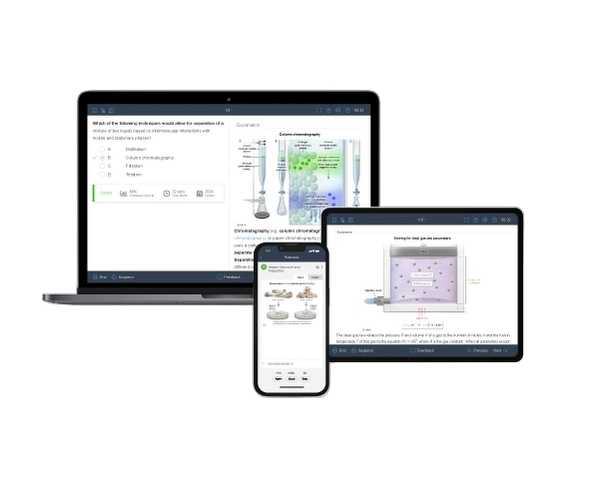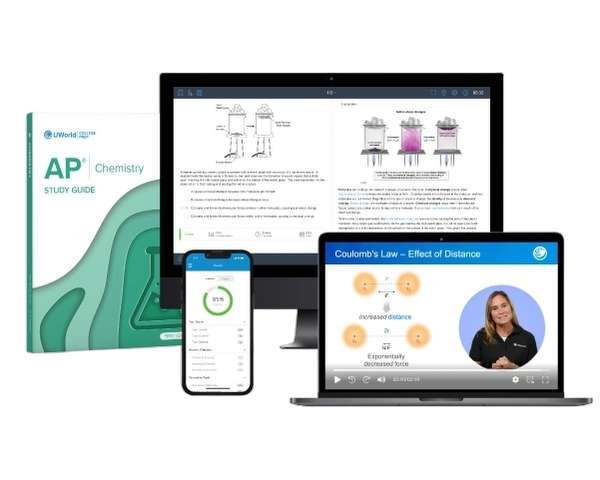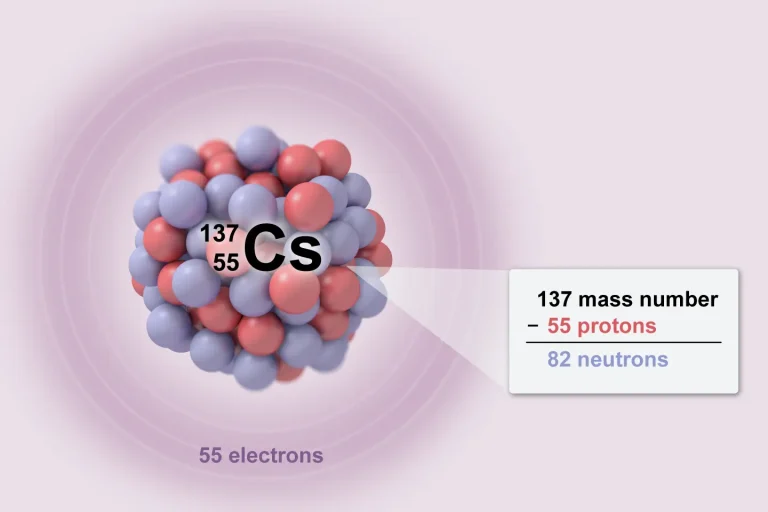Free-response questions (FRQs) on the AP® Chemistry exam account for 50% of the final score. These questions will require you to come up with your own answers rather than having multiple-choice options.
Format of AP Chemistry FRQ section
In the second section of the AP Chemistry exam, you'll read 7 free-response questions in the Bluebook™ app, but you'll write your answers by hand in a paper exam booklet. Knowing how to approach these questions will help you excel in this section.
FRQ Types on the AP Chemistry Exam
The first 3 FRQs on this portion of the AP Chemistry exam are worth 10 points each. The last 4 FRQs are short questions worth 4 points each. The FRQs will cover concepts and topics taught in AP Chemistry. General types of questions you could encounter in this section include:
- Examine molecular or atomic representations and draw conclusions
- Perform calculations using logical steps to arrive at an answer
- Analyze a particular experimental design
- Analyze experimental observations and provided data
- Interpret different type of representations
How to Answer AP Chemistry Free-Response Questions
Success on the exam depends on how well you know the content, whether you tackle questions efficiently, and how well you use your time. Here's how to approach the AP Chemistry FRQs to get the highest score possible:
Use Your Time Wisely
You have 1 hour and 45 minutes to complete this section of the AP Chemistry exam. Aim to spend approximately 20 minutes on each long FRQ (questions 1-3) and 10 minutes on each short FRQ (questions 4-7). This will leave you approximately 5 minutes to review your work.
Read each part of a question before writing down any answers. Start by answering the parts of the question you feel most comfortable with.
- If you get stumped on any part of a question, skip it and go to the next part. You can always return to it at the end if you have time. Don't spend too much time on any one question.
- If you have time left after completing each question, review your answers to ensure you have addressed all parts of each question.
Pro Tip: Our timed AP Chemistry practice exams can help you simulate the actual test environment so you can perfect your time management skills before exam day.
Be Clear and Concise
To score maximum points on each FRQ, directly address all parts of the question without restating it. Focus on demonstrating your understanding, keeping your response relevant and detailed. Write legibly and use complete sentences. If you are given options in the question (Does the temperature increase, decrease, or stay the same when the pressure is increased?), state one of the given options in your answer. Don't make up an option that isn't given.
- Know when to stop. After addressing each part of the question, avoid adding extra information that could contradict your answer and cost you points.
- Be precise. Only provide the number of examples or diagrams the question requests. Additional examples won't be scored, even if a previous one is incorrect.
- Check Your Answer. For math questions, ensure your calculated answer makes sense. For example, negative values for concentration or mass would be incorrect.
- Explain What You Know. If you can't remember the name of a specific term, try to explain it the best you can. Remember, you are trying to show that you understand the concepts.
Pay Attention to What the Question Is Asking
Each task verb in an FRQ aligns with specific scoring guidelines, so it is important to focus on these key terms.
- Start by jotting down task verbs and instructions, then outline your response. As you complete each part, mark off the tasks to ensure you've fully addressed everything before moving on to the next question.
- For calculation-based questions, always show your work and round your answer only at the end. Remember to be mindful of significant figures and include properly abbreviated units when needed.
Next, we'll dive into common task verbs and examples of how they're used in FRQs, so you'll know exactly what to do when you encounter them.
Common Task Verbs and Their Meanings
Each FRQ on the AP Chemistry exam uses task verbs that ask you to do something specific. If you correctly complete each requirement that the task verbs ask, you will receive the maximum points possible for that question. Our AP Chem study guide gives detailed explanations of each task verb, so you're fully prepared to respond in the best way possible.
1. Calculate
You will apply mathematical steps such as basic algebra and formulas from the provided Equations and Formula sheet to arrive at a final calculated answer.
Example: Calculate the value of ΔH° for the reaction.
- For this type of question, show your work because it's usually worth a point in addition to the one you receive for arriving at the correct answer.
- Pay attention to significant figures and remember to round only at the end of the calculation.
- Include units with your answer when applicable.
- Use your approved calculator to perform mathematical calculations and ensure accuracy.
- Draw a box around your final answer so the reader can easily pick it out.
2. Describe
You will provide information about a particular process, topic, or experiment.
Example: Describe how you would prepare a 0.25 M solution of KCl(aq).
- Show that you understand the process, topic, or experiment by providing a concrete example after your description of the topic.
- If you're asked to describe the process of doing something in a lab, include the proper glassware you would use. For example, you would measure the volume of a liquid with a graduated cylinder, not a beaker or Erlenmeyer flask.
3. Determine
You will need to come to a decision or conclusion after evaluating specific information provided in the question. This is a test of your critical thinking skills. You could also be asked to perform a calculation with this task verb.
Example: Determine whether your answer to part (a) above supports the student's claim that the reaction is endothermic. Justify your answer.
- To earn maximum points, provide reasoning or evidence showing how you arrived at your determination.

4. Estimate
You will be required to estimate a specific value or parameter from given information such as a graph or Lewis structure. You may also need to apply content knowledge to the given information to correctly answer the question.
Example: Based on the titration curve, estimate the pKa of the acid.
- If the value you are estimating has units associated with it, include them in your estimation.
5. Explain
You must provide information about why a particular thing happened or the motivations or reasons for its occurrence. You may also need to discuss how something happened.
Example: A student noticed that the pH of the solution barely changed when 0.1 M NaOH(aq) was added to a solution. Explain this observation.
- Use specific examples or data provided in the question.
- Demonstrate that you can make a specific concept understandable to another person.
6. Identify/Indicate/Circle
You will need to indicate or give information pertaining to a specific subject.
Example: Identify the cathode in the galvanic cell.
- The “identify” task verb could also be in the form of “circle,” where you must circle something from a given list.
- Ensure you are doing exactly what the question is asking. For example, if a question asks you to circle a compound, make sure you circle it instead of boxing it or marking it in another way.
- Answer only what is asked and provide reasoning if necessary.
7. Justify
You will provide evidence to show that a particular claim is true.
Example: Which acid is stronger, HNO3(aq) or CH3COOH(aq)? Justify your answer based on the particulate representation above.
- You may also be asked to provide reasoning to explain how your evidence supports, defends, or modifies the claim.
- This type of question generally requires using data provided in the FRQ.
8. Make a Claim
You will make an assertion based on evidence or knowledge.
Example: Make a claim about whether the reaction will be exothermic or endothermic.
- Ensure that your claim is clear and directly tied to the evidence presented in the question.
9. Predict/Make a Prediction
You will need to predict the causes or effects of a change in, or disruption to, one or more components in a relationship, pattern, process, or system.
Example: Predict the shift in equilibrium when additional O₂ is added to the reaction vessel.
- Provide reasoning with your prediction to explain why the predicted change will occur.
10. Represent/ Draw/ Write an Equation/ Complete a Diagram
You will use appropriate graphs, symbols, words, and/or models to describe phenomena, characteristics, and/or relationships.
Example: Represent the neutralization reaction between NaOH and HCl by writing the balanced chemical equation.
- Make sure to include appropriate labels, states of matter, and ensure that the equation is balanced. For diagrams, be clear and add labels as needed.
Know How the FRQs are Scored
AP Chemistry teachers and college instructors use a scoring rubric to assign points for correct answers. When a specific requirement is met, the reader provides a point. The best way to score the maximum points is to prove your comprehension of each part of the question.
- Even though your AP reader is an expert, write your answers like you are trying to explain the idea to someone who is not very familiar with chemistry.
- Write your responses in the lined space provided for each question.
- Write clearly and legibly using either a black or blue pen that won't smear. Readers can't give you credit if they can't verify that you have met the scoring rubric's requirements. If you make a mistake, strike through that part so that it will not be scored.
- Fully explain and demonstrate your understanding of the concept. For instance, if you're asked to explain why one compound has a higher boiling point than another, describe the types of intermolecular forces each compound experiences and compare their strengths. Simply stating that the compound with the higher boiling point has stronger intermolecular forces wouldn't be enough.
- If a question builds on your answer to a previous part, you can still earn full credit even if the earlier answer is incorrect, as long as your reasoning is sound. For example, if you miscalculate [H+] in one part but correctly determine whether the solution is acidic or basic based on your calculation, you can still receive full credit.
- You are not penalized for incorrect answers, so attempt to answer each question with the knowledge you have if you have time. The only way to score zero points is by skipping a question.
Now that you know what the FRQ section of the AP Chemistry exam entails, it's time to start prepping with a high-quality AP Chemistry online course. They will help you master the skills you need to approach each of the seven FRQs with confidence and knowledge.

Frequently Asked Questions
How many FRQs are on the AP Chemistry exam?
The AP Chemistry exam includes 7 free-response questions: 3 long-answer and 4 short-answer questions, making up 50% of your score.
How are AP Chemistry FRQs graded?
AP Chemistry teachers and college instructors grade the FRQ section of the AP Chemistry exam. The section consists of 4 short-answer questions worth 4 points each and 3 long-response questions worth 10 points each. To learn more about AP Chem exam scoring, check out our AP Chemistry Exam Scoring guide.
How long is the FRQ section of the AP Chemistry exam?
The AP Chemistry FRQ section is 1 hour and 45 minutes long (105 minutes).
Where can I find FRQs from previous AP Chemistry exams?
You can find past free-response questions from the AP Chemistry exam on the College Board® website.
References
1(2025). Exam Components. AP Chemistry. AP Students. College Board. Retrieved from https://apstudents.collegeboard.org/courses/ap-chemistry/assessment
2(2025). Task Verbs. AP Chemistry Exam Tips. AP Students. College Board. Retrieved from https://apstudents.collegeboard.org/courses/ap-chemistry/exam-tips
3(2024). Big Ideas. Course Content. AP Chemistry Course and Exam Description. College Board. Retrieved from https://apcentral.collegeboard.org/media/pdf/ap-chemistry-course-and-exam-description.pdf
Related Topics
Do you want to find strategies for answering MCQs? Check out UWorld's How to Approach Guide to AP Chemistry Multiple Choice Questions with examples.
AP Chemistry Study Plan & TipsDo you want to know the ultimate tips and best resources for AP Chemistry? Read this for a step-by-step AP Chemistry study plan & tips to score 5.
AP Chemistry Exam FormatNot sure about how the AP Chemistry Exam Format is? Take a look at this article on types of questions, number of questions, topic-wise weight, and more!
How to Self-Study for AP ChemistrySelf-studying for AP Chemistry? Discover tips on mastering concepts, tackling practice problems, and staying organized to excel on the AP Chemistry exam!
Best AP Chemistry Study Guide ComparisonStruggling to choose the best study guide? Compare Kaplan, Barron's, Princeton Review, and UWorld to find the perfect AP Chemistry study guide for your exam success!
Best AP Chemistry Prep Course ComparisonDiscover the best AP Chemistry prep courses! This in-depth review helps you compare options and pick the course that meets your needs.



